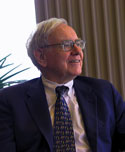Warren Buffett’s annual letter to Berkshire Hathaway shareholders is out.
 Why should you care? Well, his fund posted a record profit, last year, of $19.5 billion. It owns meaningful parts of American Express, Goldman Sachs, Wells Fargo, IBM, Exxon, Phillips 66, Walmart, Coca Cola … and the list goes on.
Why should you care? Well, his fund posted a record profit, last year, of $19.5 billion. It owns meaningful parts of American Express, Goldman Sachs, Wells Fargo, IBM, Exxon, Phillips 66, Walmart, Coca Cola … and the list goes on.
Buffett's annual letter is always an interesting read … even if you don’t agree with everything he says. There is a reason he is called “the Oracle of Omaha.”
Here are a few of the ideas that I noted.
Own Low-Cost S&P 500 Index Funds:
Mr. Buffett advocates going long "the economic future of the United States."
That sentiment was nothing new for him: "We’ve been making similar wagers ever since Buffett Partnership Ltd. acquired control of Berkshire in 1965. For good reason, too. Charlie and I have always considered a 'bet' on ever-rising U.S. prosperity to be very close to a sure thing."
Historically, Mr. Buffett has cautioned against trying to pick winning stocks. Instead “own a cross section of businesses that, in aggregate, are bound to do well.” A low-cost S&P 500 index fund helps any investor do this well.
Mr. Buffett has emphasized this point throughout his investing career.
“In the 20th century, the Dow Jones industrial average advanced from 66 to 11,497, paying a rising stream of dividends to boot. The 21st century will witness further gains, almost certain to be substantial.”
Mr. Buffett writes that when he passes away, he has left instructions for his trustee to invest the cash designated for his wife in two ways — 10% in short-term government bonds and 90% in a very low-cost S&P index fund. He suggests Vanguard’s index fund.
“I believe the trust’s long-term results from this policy will be superior to those attained by most investors who employ high-fee managers.”
Swing Both Ways When It Comes To Investing:
Buffett said Berkshire likes to buy businesses outright, but also will invest large sums in stock or partial ownership of a company, to increase its profit opportunities.
"Woody Allen stated the general idea when he said: 'The advantage of being bisexual is that it doubles your chances for a date on Saturday night.' Similarly, our appetite for either operating businesses or passive investments doubles our chances of finding sensible uses for our endless gusher of cash."
A Hint Towards the Future:
Three things struck me here.
First, in describing the large purchase and financing of ketchup maker (H.J. Heinz), Mr. Buffett called it a 'template' that Berkshire Hathaway could use in future acquisitions.
Second, near the end of this year's letter, Mr. Buffett notes that most Americans don’t understand the math behind pensions … and cautions about the 'accelerating' dangers of local and state financial problems. Pensions, he says, have become a "gigantic financial tapeworm" because "public entities promised pensions they couldn’t afford." Mr. Buffett predicts: "During the next decade, you will read a lot of news — bad news– about public pension plans."
Third, he said: "Next year’s letter will review our 50 years at Berkshire and speculate a bit about the next 50." Interesting …
Mr. Buffett has often said: "At Berkshire, our time horizon is forever." That perspective makes it a lot easier for the game not to end until you've won.
It reminds me of a lesson from an earlier Annual Letter:
Nothing stopped so many innovators and entrepreneurs more than the fear of failure. If you allow yourself to be constantly scared into thinking that the world is doomed you will never take that risk which might result in great reward. And perhaps worse, if you never fail you will never learn to get up, brush yourself off, move on and succeed in the future. This does not mean you should wander through this world with great complacency and blind optimism, but if you deny yourself the ability to maximize your full potential, you will always come up short.
Two Other Things:
- Quicken Loans announced on Tuesday a $1 billion prize paid out over 40 years—insured by Warren Buffett's Berkshire Hathaway—to anyone who pulls off the ultimate forecasting feat in sports: predicting every tournament game's winner.The winner also gets investment advice from Mr. Buffett. (WSJ)
- Buffett bulleted five fundamentals of investing (BusinessInsider)


Leave a Reply